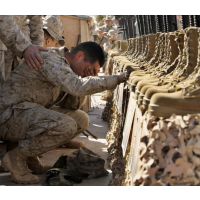January 08, 2015 - In the 13 years since the September 11 terrorist attacks, the United States has spent a total of $1.6 trillion financing military operations in Iraq, Afghanistan, and other theaters of the global war on terror — according to calculations made by the Congressional Research Service. The U.S. government’s massive spending sum includes the cost of military operations, the training of security forces in Afghanistan and Iraq, reconstruction, weapons maintenance, base support, foreign aid, embassy costs, and veterans health care.
This $1.6 trillion figure may seem small compared to some estimates that have been made. Harvard’s Kennedy School of Government forecast in 2013 that the decade-long wars in the Middle East would eventually cost American taxpayers as much as $6 trillion. With that price tag, roughly the same as the annual gross domestic product of India, this smaller sum may seem more manageable. But it is important to remember that the $1.6 trillion has already been spent. The $6 trillion sum is a long-term estimate that includes such considerations as the lifetime medical costs of the 2.5 million veterans of Afghanistan and Iraq, many of whom served multiple deployments, survived injuries that would have been fatal in other U.S. wars, and now face huge mental and physical challenges. “Another major share of the long-term costs of the wars comes from paying off trillions of dollars in debt incurred as the U.S. government failed to include their cost in annual budgets and simultaneously implemented sweeping tax cuts for the rich,” stated the report. “In addition, huge expenditures are being made to replace military equipment used in the two wars.” In fact, Harvard researchers claimed that the largest portion of the War on Terror’s bill has yet to be paid.
snip
As it has for centuries, war literature has acted as a catharsis for the writer, bridged the gap between the soldier at war and the home front, and borne witness to the death and chaos of the battlefield. The works penned by veterans of the wars in Afghanistan and Iraq also point out the the most important particularities of those conflicts: The changes in technology, the increased presence of female soldiers, and “most importantly, the all-volunteer military, which has opened a chasm between soldiers (“the other 1 percent”) and civilians,” according to Kakutani. “With no shared sacrifices being asked of civilians after Sept. 11 and a ban (with origins in the first Gulf War and lifted in 2009) on photographing coffins on military bases, it’s no surprise that the disconnect between life ‘over there’ and life ‘back here’ has emerged as a central theme in much of today’s war writing.”
Of course, when soldiers were deployed, and to which country, drove the narratives. “Early successes in Afghanistan made for very different sorts of narratives than those that would come out of Iraq later, when knowledge of just what a misguided enterprise it was (cherry-picked intelligence, bungled decision making in Washington and a dysfunctional occupation) had created a dark undertow to many soldiers’ perception of their own experiences,” concluded Kakutani. read more>>>

22 December 2014 - The ACLU and Human Rights Watch say the offences amount to ‘a vast criminal conspiracy’ and are ‘shocking and corrosive’ to US democracy and credibility read more>>>
The Royal United Services Institute said the UK could face a bill of nearly £65bn, once the cost of long-term care for injured veterans was factored in, with most of the money was spent on the wars in Iraq and Afghanistan.
The study, called Wars in Peace, said both conflicts were largely “strategic failures” for the UK, The Guardian reported."
"And when you add up to the Department of Defense, Department of State, CIA, Veterans Affairs, interest on debt, the number that strikes me the most about how much we're committed financially to these wars and to our current policies is we have spent $250 billion already just on interest payments on the debt we've incurred for the Iraq and Afghan wars." 26 September 2014
December 22 2014 - American taxpayers have shelled out roughly $1.6 trillion on war spending since 9/11, according to a new report from Congress’ nonpartisan research arm. That’s roughly $337 million a day -- or nearly a quarter million dollars a minute -- every single day for 13 years. read more>>>
Chris Hayes MSNBC: "If you can run a deficit to go to war, you can run a deficit to take care of the people who fought it" In response to Republican opposition to expanding Veterans' benefits on fiscal grounds
Neither of these recent wars have yet been paid for, let alone the results from, including the long ignored or outright denied existence of, till this Administrations Cabinet and Gen Shinseki, only Government branch consistent for the past six years, issues! As well as under deficits most of the, grossly under funded, VA budget is still borrowed thus added, problem creating, costs that shouldn't exist!









No comments:
Post a Comment